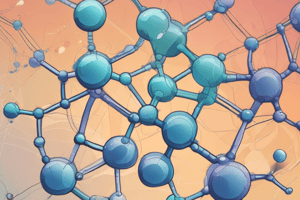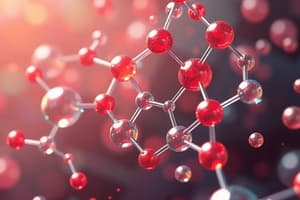Podcast
Questions and Answers
What is the general structure of amines and what functional groups do they contain?
What is the general structure of amines and what functional groups do they contain?
Amines contain a basic nitrogen atom with a lone pair and are formally derivatives of ammonia, wherein one or more hydrogen atoms have been replaced by a substituent such as an alkyl or aryl group.
Give examples of important amines mentioned in the text.
Give examples of important amines mentioned in the text.
Important amines include amino acids, biogenic amines, trimethylamine, and aniline.
What is the difference between primary (1°) amines and aromatic amines?
What is the difference between primary (1°) amines and aromatic amines?
Primary (1°) amines arise when one of three hydrogen atoms in ammonia is replaced by an alkyl or aromatic group, while aromatic amines have the nitrogen atom connected to an aromatic ring.
How are amines classified based on the nature and number of substituents on nitrogen?
How are amines classified based on the nature and number of substituents on nitrogen?
What are compounds with a nitrogen atom attached to a carbonyl group called, and how do they differ from amines?
What are compounds with a nitrogen atom attached to a carbonyl group called, and how do they differ from amines?
Flashcards are hidden until you start studying
Study Notes
General Structure of Amines
- Amines are organic compounds containing nitrogen atoms bonded to hydrogen and/or carbon atoms.
- Their basic structure can be represented as R-NH2, R2-NH, or R3-N, where R denotes a hydrocarbon group.
Functional Groups of Amines
- The defining functional group in amines is the amino group (-NH2).
- Amines can also contain additional functional groups, impacting their properties and reactivity.
Examples of Important Amines
- Common examples include methylamine (CH3NH2) and aniline (C6H5NH2).
- Cholinergic amines, like acetylcholine, play critical roles in neurotransmission.
Primary Amines vs. Aromatic Amines
- Primary (1°) amines have one alkyl or aryl group attached to the nitrogen atom, resulting in the structure R-NH2.
- Aromatic amines contain an amino group directly attached to an aromatic ring, such as in aniline.
Classification of Amines
- Amines are classified based on the number of carbon substituents on the nitrogen:
- Primary (1°): one carbon attached to nitrogen.
- Secondary (2°): two carbons attached to nitrogen.
- Tertiary (3°): three carbons attached to nitrogen.
Nitrogen-Containing Compounds with Carbonyl Groups
- Compounds featuring a nitrogen atom connected to a carbonyl group are called amides.
- Amides differ from amines as they possess a carbonyl group (C=O) adjacent to the nitrogen, affecting their reactivity and physical properties.
Studying That Suits You
Use AI to generate personalized quizzes and flashcards to suit your learning preferences.




